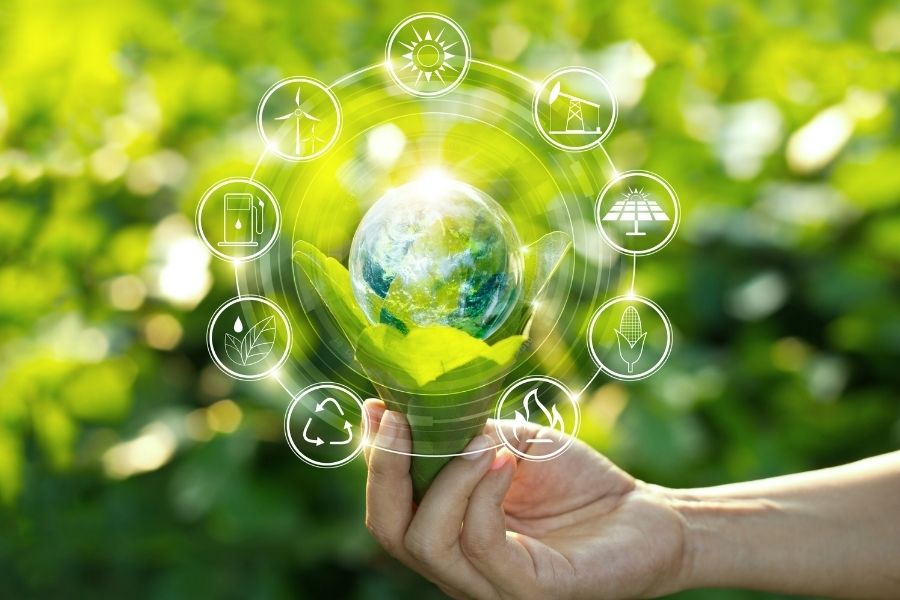In the world of apple farming and sustainable horticulture, there is a growing emphasis on practices that not only yield bountiful harvests but also nurture the planet for future generations. Sustainability, in this context, means carefully stewarding our resources—land, soil, and ecosystems—so they can naturally renew themselves without compromising other vital resources.
Sustainable Farming: Balancing the Equation
Sustainable farming is about efficiently managing natural resources for agriculture while meeting evolving human needs. It’s a commitment to enhancing environmental quality, preserving natural resources, and ensuring the well-being of both animals and communities. This approach employs eco-friendly farming methods that allow for the cultivation of crops and livestock without harming the environment or human systems. Key elements of sustainable agriculture include permaculture, agroforestry, mixed farming, multiple cropping, and crop rotation. The ultimate goal? To conserve natural resources and reduce pollution and environmental damage while bolstering productivity.
A Promise to Future Generations
Sustainability is founded on the principle that our actions today should not jeopardize the ability of future generations to meet their needs. The challenges we face in agriculture—from droughts and energy demands to opaque food supply chains—are driving the shift from conventional industrial farming to sustainable practices.
Why Go Sustainable?
- Restoring and Nourishing the Soil: Sustainable farming is a remedy for soil degradation, enriching the earth for generations to come.
- Harmony with Nature: It works hand in hand with nature, promoting biodiversity and reducing the use of synthetic chemicals.
- Energy Efficiency: Sustainable farms consume less energy, contributing to reduced greenhouse gas emissions.
- Water Conservation: They protect and conserve water resources, vital for both farming and ecosystems.
- Valuing Diversity: Sustainability embraces diversity in crops, breeds, and farming techniques.
- Climate Resilience: In a changing climate, sustainable farming provides resilience.
- Supporting Local Communities: Local sustainable farms bolster local economies and communities.
- Profitability: It can be both profitable and beneficial for people and the planet.
Sustainability and Apple Farming
Sustainable apple farming involves practices that mimic nature to preserve soil fertility, prevent water pollution, and safeguard biodiversity. It aligns with global objectives like the Sustainable Development Goals and Zero Hunger, making it a crucial part of the solution to food security challenges.
Environmental Impact
Sustainable agriculture is a win for the environment. It uses 30% less energy per crop yield unit compared to industrialized agriculture, reducing reliance on fossil fuels and minimizing chemical pollution.
Economic Benefits
Sustainable farming isn’t just eco-friendly; it’s also good for the economy. It’s more labor-intensive and can create up to 30% more jobs. Additionally, sustainably produced food often commands higher prices, benefiting farmers.
A Path to Resilience
Sustainable agriculture enhances our capacity to adapt to climate change and variability while making efficient use of natural resources. It’s a vital step towards more resilient and productive food systems that reduce poverty and improve food security.
A Greener Tomorrow
By adopting sustainable practices, farmers play a crucial role in conserving the environment, reducing pollution, and ensuring that our resources remain plentiful and vibrant. These practices are an investment in the future, supporting a growing population’s demand for food.
The Future of Sustainable Apple Farming
As we move forward, sustainable agriculture and technology are poised to reshape the future of apple farming. Orchardly’s cutting-edge technologies provide accurate field and weather data, reduce the need for fertilizers and pesticides, increase efficiency, and lower fuel consumption.
Sustainable development is not just a trend; it’s a commitment to improving the quality of life on Earth. Environmental, economic, and social changes are essential for building a society that is sustainable for generations to come.


